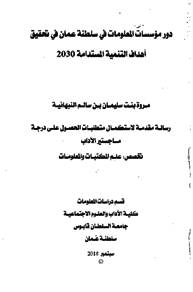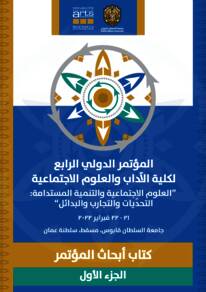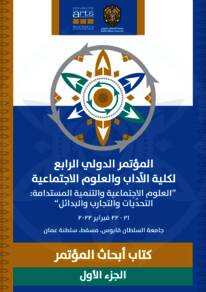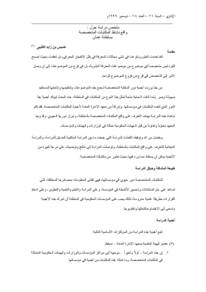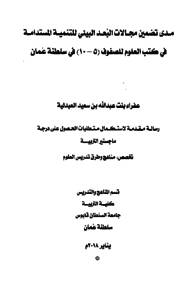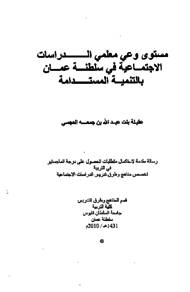Document
دور مؤسسات المعلومات في سلطنة عمان في تحقيق أهداف التنمية المستدامة 2030
Publisher
جامعة السلطان قابوس
Gregorian
2018
Language
Arabic
Subject
English abstract
The study aimed to identify the role of information institutions in the sultanate of oman in achieving the sustainable development goals 2030 through identifying the extent to what the employees of library sector and cultural centers are aware of the goals of sustainable development 2030 and how they can be achieved. It also aimed at identifying the activities and initiatives undertaken by Omani information institutions to contribute to the achievement of these goals and their efforts in making information accessible to all in order to achieve the goals. Furthermore, the study aimed to find out the obstacles that prevent the institutions from achieving these goals and their involvement in setting the local development plans and bringing out their role in that. Another objective that the study aimed to find out is the extent to what the decision makers are aware of these institutions' role in providing information as a key driver in achieving sustainable development goals 2030. To achieve its goals the study has adopted Mixed Methods Approach, which combines quantitative and qualitative data to understand the subject of research deeply and broadly. The study relied on collecting data from questionnaire, activities form, analyzing documents and semi-structured interviews, which have been applied gradually. The study came up with a number of results, the most important of which are: The employees of libraries sector and cultural centers have a good understanding of sustainable development concept, although they were not familiar with the sustainable development goals 2030. The same thing with the information institutions, they have implemented many activities and programs that contributed to the achievement of the sustainable development goals without prior planning to do so. The results of the study also showed that all information institutions have contributed proportionally in achieving the sustainable development goals in terms of number of institutions that take part in achieving each goal and the number of activities conducted to serve each goal. It also showed that there are four main categories of information access adopted by the Omani information institutions which are: accessibility for people with special needs, accessibility in several languages, full access to information and accessibility through training and teaching. It is also noted that the obstacles faced by institutions of information, from the viewpoint of the employees of library sector and cultural centers and administrations of information institution, are almost the same; and they are categorized into: financial obstacles, unfamiliarity with the sustainable development goals, administrative and human obstacles. Furthermore, the results showed that all information institutions are involved in the development plans either directly or through their supervising institution. Also it is revealed that there is an awareness among decision makers regarding the role played by information institutions in contributing to the achievement of development plans and sustainable development goals, and a clear interest to develop the information sector in the Ninth Five year Plan (2016-2020) and the Future Vision (Oman 2040). Based on the findings, the study came out with many recommendations, the most important of which are: enhancing the awareness of employees in information institutions about the sustainable development goals and the ways to achieve them which can be achieved through training courses and introducing workshops, working on finding other sources of financial support like encouraging the private sector to support the programs and initiatives of information institutions so that contributes to the achievement of the sustainable development goals broadly, and working on building and activating joint cooperation between information institutions and institutions concerned of special needs people in order to enhance their right to access to information and find effective mechanisms to increase their opportunities to access to information sources and benefit from countries' expertise in this area.
Description
رسالة جامعية
Member of
Resource URL
Arabic abstract
هدفت الدراسة إلى التعرف على دور مؤسسات المعلومات في سلطنة عمان في تحقيق أهداف التنمية المستدامة 2030 من خلال التعرف على مدى وعي العاملين في قطاع المكتبات والمراكز الثقافية بأهداف التنمية المستدامة 2030 وسبل تحقيقها، والأنشطة والمبادرات التي تقوم بها مؤسسات المعلومات العمانية للمساهمة في تحقيق تلك الأهداف، وجهودها في إتاحة المعلومات وتمكين الوصول إليها من قبل الجميع بما يخدم تحقيق أهداف التنمية المستدامة 2030، بالإضافة إلى التعرف على المعيقات التي تحد من مساهمتها في تحقيق أهداف التنمية المستدامة 2030، ودورها في المشاركة في وضع خطط التنمية المحلية وإبراز دورها كشريك في التنمية، ومدى وعي متخذي القرار بدورها في إتاحة المعلومات كمحرك أساسي في تحقيق أهداف التنمية المستدامة 2030. اعتمدت الدراسة لتحقيق أهدافها على المنهج المزجي Mixed Methods Approach، الذي يجمع بين البيانات الكمية والنوعية لفهم موضوع البحث فهما أوسع من مختلف جوانبه؛ إذ اعتمدت الدراسة على الاستبانة واستمارة الأنشطة وتحليل الوثائق والمقابلة شبة المقننة، تم التدرج في استخدامها وفق الترتيب المذكور. توصلت الدراسة إلى عدة نتائج أبرزها: على الرغم من عدم الاطلاع المسبق من قبل العاملين في قطاع المكتبات والمراكز الثقافية على خطة الأمم المتحدة للتنمية المستدامة والأهداف السبعة عشر إلا أنه اتضح أن هناك فهم جيد لمفهوم التنمية المستدامة وأن مؤسسات المعلومات نفذت بتنفيذ العديد من الأنشطة والبرامج المساهمة في تحقيق أهداف التنمية المستدامة دون التخطيط المسبق لأن تكون لتحقيق أهداف التنمية المستدامة. كما أظهرت نتائج الدراسة إسهام جميع مؤسسات المعلومات عينة الدراسة في تحقيق أهداف التنمية المستدامة، وأن جميع الأهداف السبعة عشر تم الإسهام في تحقيقها من قبل مؤسسات المعلومات بنسب متفاوتة من حيث عدد المؤسسات المساهمة في تحقيق كل هدف وعدد الأنشطة المنفذة في كل هدف. وأظهرت كذلك وجود أربع فئات رئيسة لإتاحة المعلومات من قبل مؤسسات المعلومات العمانية هي: الإتاحة الفئات الخاصة، والإتاحة بعدة لغات، والوصول الكامل إلى المعلومات، والإتاحة عن طريق التدريب والتدريس، كما أشارت إلى تشابه. المعيقات التي تواجه مؤسسات المعلومات من وجهة نظر العاملين في المكتبات والمراكز الثقافية، وإدارات مؤسسات المعلومات، وهي: المعيقات المالية، وعدم الوعي بماهية أهداف التنمية المستدامة، والمعيقات الإدارية، والبشرية. وأوضحت النتائج إشراك جميع مؤسسات المعلومات في الخطط التنموية إما بصورة مباشرة أو من خلال الجهات المشرفة عليها، كما أوضحت وجود وعي من قبل متخذي القرار بدور مؤسسات المعلومات في تحقيق الخطط التنموية وأهداف التنمية المستدامة، ووجود اهتمام واضح بتطوير قطاع المعلومات في الخطة الخمسية التاسعة (2016- 2020) والرؤية المستقبلية (عمان 2040). خرجت الدراسة بناء على ما توصلت إليه من نتائج بمجموعة من التوصيات أهمها: تعزيز وعي العاملين في مؤسسات المعلومات بأهداف التنمية المستدامة ويبل تحقيقها من خلال الدورات التدريبية والورش التعريفية، والعمل على إيجاد مصادر أخرى للدعم المادي، كتشجيع القطاع الخاص على دعم برامج ومبادرات مؤسسات المعلومات بما يساهم في تحقيق أهداف التنمية المستدامة بشكل أوسع، والعمل على بناء وتفعيل تعاون مشترك بين مؤسسات المعلومات والجهات المعنية بذوي الإعاقة من أجل تعزيز حقهم في الوصول إلى المعلومات، وإيجاد آليات فاعلة لزيادة قدرتهم على الوصول إلى مصادر المعلومات، والاستفادة من تجارب الدول في.
Category
Theses and Dissertations

